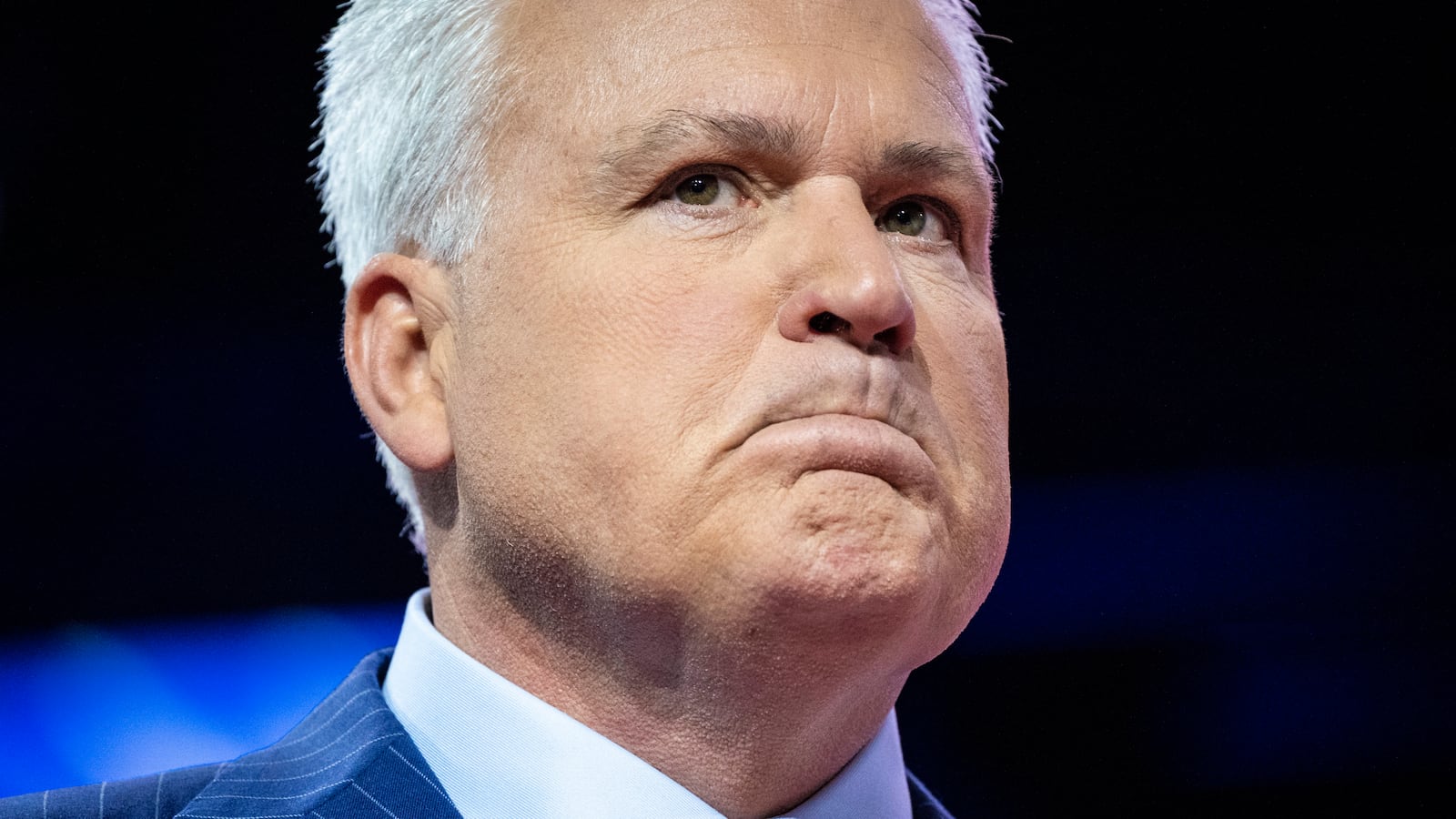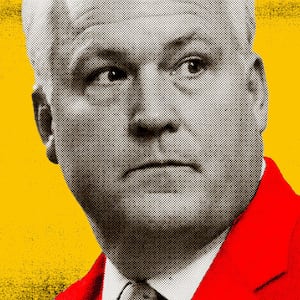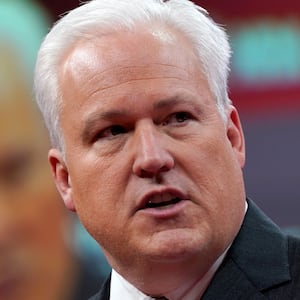Amid allegations of sexual assault at the hands of CPAC leader Matt Schlapp, as well as financial mismanagement at the conservative group, a top official at the CPAC Foundation resigned in August with a private letter decrying a culture of secrecy and “blind loyalty” designed to protect Schlapp.
While it was publicly reported at the time that the official, former CPAC vice president Charlie Gerow, had submitted a private letter to the group’s Board of Directors, the full content of that letter has never been revealed. It was obtained by The Daily Beast as part of the lawsuit against Schlapp in Virginia’s Alexandria Circuit Court, which was filed in January by Carlton Huffman, a Republican operative who alleges the ACU chief groped him without his consent in 2022.
In his roughly 2,800-word letter, Gerow—an active CPAC leader for decades—aired concerns that the group, which hosts the annual CPAC events, was violating Washington, D.C., nonprofit laws and potentially keeping board members in the dark about financial mismanagement and legal arrangements.
Gerow also said CPAC never independently investigated Huffman’s allegations, and warned board members about investing too much confidence in Schlapp as a leader—especially given how Schlapp and his allies turned on him after he raised concerns about the extraordinary lengths the group was going to defend its chairman in a personal matter.
Gerow also asked the board to commission an outside law firm or agency to investigate sexual misconduct allegations against Schlapp, “including those made by Carlton Huffman and any others of which the Board or staff may be aware.” (The Daily Beast has previously confirmed The Washington Post’s reporting on two additional alleged incidents.)
The Daily Beast sent a comment request to CPAC, but did not immediately receive a reply. Reached for comment, Gerow told The Daily Beast that “the letter speaks for itself” and declined to comment further.
When Huffman’s allegations first surfaced in January, Gerow agreed to defend Schlapp, and recalled the CPAC chief saying “I love you and trust you.” But after asking “difficult questions that all of us should be asking,” Gerow wrote, Schlapp said he was “disloyal” and a “snake.”
In resigning from the organization, Gerow laid out a series of troubling observations suggesting the institutional rot at CPAC predated Huffman’s allegations, but hit a breaking point with the sexual assault scandal.
Given the shocking amount of CPAC funds spent to defend Schlapp in his lawsuit—which Gerow said reached $1 million even before the discovery phase of litigation began—Gerow worried that the organization was not in compliance with its own bylaws or D.C. law governing nonprofits.
Under that law, Gerow wrote, any decision for a nonprofit to cover litigation costs triggers certain obligations, such as signing an affirmation of terms of coverage.
In the spring, Gerow said, he visited CPAC headquarters in Virginia to talk to Schlapp and in hopes of reviewing that affirmation document. He found that it did not exist.
“Although I was presented with reams of paper I had not asked for, this vital sheet of paper was missing,” he said. Months later, he still had not seen it, even though Schlapp’s signed affirmation had been unanimously ordered by the CPAC board.
According to Gerow, Schlapp and his allies simply continued to insist they were in compliance with organization bylaws and nonprofit statutes, without providing much in the way of evidence.
The concern over the arrangement of Schlapp’s legal defense only deepened when Gerow learned that the chairman had worked with David Safavian, CPAC’s general counsel, to add an “indemnification” clause to his compensation agreement—an agreement that CPAC would cover some or all of his legal expenses arising from the Huffman lawsuit.
“This startled me as I had never seen the agreement and had never been told that an indemnification provision was potentially involved,” Gerow said.
In Gerow’s view, the consequences of this arrangement were only growing more dire.
“Tragically, for those who are encouraging Matt to ‘fight this to the end’ the costs are already staggering,” he wrote. “Earlier this year we were advised that the legal strategy of Matt's counsel would ‘blow this case out of the water’ within 30 days. That obviously did not happen. Instead huge legal bills continue to mount.”
In Gerow’s prediction, the Huffman lawsuit will not go to trial but instead result in a settlement “with a cost in the millions of dollars.” Gerow also expressed concerns about how much of those costs CPAC’s insurance would ultimately cover, and how much of its own money the group was risking on Schlapp’s personal behalf.
In September, a CPAC spokesperson told The Daily Beast that, “for their part, the Schlapps have been firm in their resolve to be vindicated and are fully prepared to go to trial.” That same month, CPAC and Schlapp were hit with a second, separate employment discrimination lawsuit seeking a total $55 million in damages.
Generally, Gerow expressed confusion and concern that the CPAC never commissioned “any independent investigation into the underlying accusations made against Matt Schlapp, something any similarly situated nonprofit or for profit corporation would have done.”
All these details left Gerow—and at least one other board member who resigned—worried that the institutional defense of Schlapp left the organization beholden to him, not fulfilling its statutory obligation to the corporation.
“I was deeply disturbed when one of our newer Directors sent an email several weeks ago telling us that ‘Each and every Board Member serves at the pleasure of the Chairman,’” Gerow wrote.
Gerow also alleged that, in December, CPAC staff were “required to sign non-disclosure agreements they had not previously been asked to sign,” and were threatened with loss of pay if they did not.
In addition to detailing how Schlapp’s attitude toward him changed abruptly, Gerow outlined how his former allies in the group plotted behind his back to get rid of him for his dissent. Safavian, the general counsel, accidentally sent him a text message saying “we are likely going to take him off the board at our 8/24 meeting,” something Gerow said all ACU officials should find “chilling.”
In August, The Washington Post reported that Gerow resigned while calling for an independent probe of the allegations made against Schlapp. In the letter, he not only called for that probe but also for a forensic audit of CPAC’s books, as well as a written opinion from outside counsel on the group’s compliance with its own bylaws and D.C. law.
Gerow’s departure was the second major exit from the CPAC board following Huffman’s allegations. The first came in May, when the group’s longtime treasurer, former congressman Bob Beauprez, resigned because he had “lost confidence” in the organization under Schlapp’s leadership.
Under scrutiny, Schlapp has maintained his innocence in the Huffman case and insisted that all at CPAC is above board. The conservative establishment, of which he and CPAC are a fixture, continues to embrace Schlapp.
According to Gerow, even as he has maintained his innocence publicly and trashed critics privately, Schlapp has not spoken to him since he raised his concerns.
“Matt has never called me personally to discuss any of this,” he wrote.
“Despite many messages and texts for Matt he simply hasn’t found it in his heart to call me back,” Gerow wrote, recycling the phrase that Schlapp used after Huffman brought his allegation to the Walker campaign last October.
“If you could see it in your heart to call me at the end of day. I would appreciate it,” Schlapp texted Huffman at the time. “If not I wish you luck on the campaign and hope you keep up the good work.”









